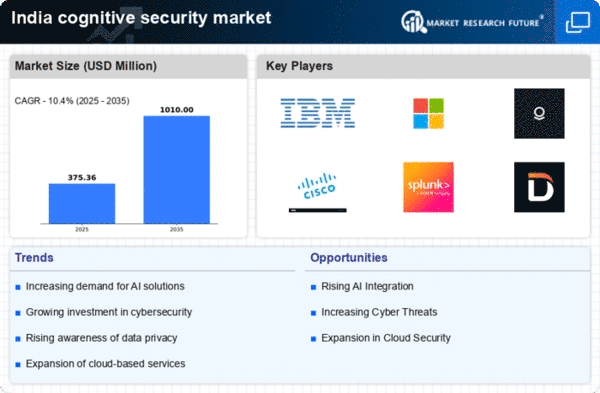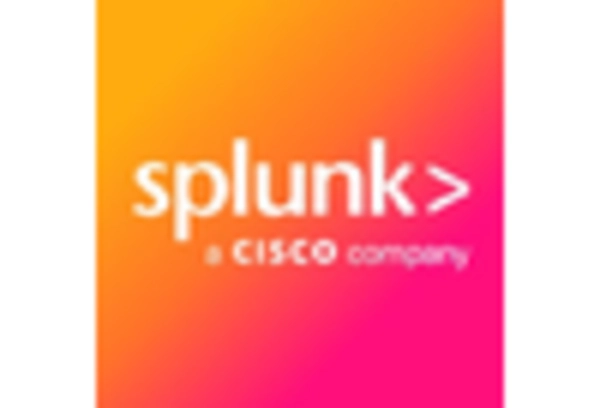Rising Cyber Threats
The increasing frequency and sophistication of cyber threats in India is a primary driver for the cognitive security market. Organizations are facing a surge in cyberattacks, with reports indicating a rise of over 30% in incidents over the past year. This alarming trend compels businesses to invest in advanced cognitive security solutions to protect sensitive data and maintain operational integrity. The cognitive security market is responding to this demand by offering innovative solutions that leverage artificial intelligence and machine learning to detect and mitigate threats in real-time. As companies prioritize cybersecurity, the market is expected to grow significantly, with projections suggesting a compound annual growth rate (CAGR) of around 25% over the next five years.
Increased Digital Transformation
The rapid digital transformation across various sectors in India is significantly impacting the cognitive security market. As businesses adopt digital technologies, the attack surface expands, leading to heightened vulnerabilities. Reports indicate that over 70% of organizations are undergoing digital transformation initiatives, which necessitate robust security measures. The cognitive security market is adapting to this shift by providing solutions that integrate seamlessly with digital platforms, ensuring comprehensive protection against emerging threats. This trend is expected to drive market growth, as organizations seek to safeguard their digital assets and maintain customer trust. The demand for cognitive security solutions is likely to rise, with market analysts projecting a growth trajectory that aligns with the pace of digital adoption.
Growing Awareness of Data Privacy
There is a growing awareness of data privacy among consumers and businesses in India, which is influencing the cognitive security market. With increasing incidents of data breaches, organizations are under pressure to comply with data protection regulations and safeguard customer information. The cognitive security market is responding to this demand by offering solutions that not only protect data but also ensure compliance with evolving privacy laws. As businesses strive to build trust with their customers, the emphasis on data privacy is likely to drive investments in cognitive security technologies. Market forecasts suggest that this trend could lead to a substantial increase in the adoption of cognitive security solutions, as organizations prioritize data protection as a core component of their operational strategy.
Emergence of Advanced Technologies
The emergence of advanced technologies such as artificial intelligence, machine learning, and big data analytics is reshaping the cognitive security market. These technologies enable organizations to enhance their security posture by providing real-time insights and predictive capabilities. In India, the adoption of these technologies is accelerating, with many companies recognizing their potential to combat cyber threats effectively. The cognitive security market is witnessing a surge in demand for solutions that leverage these advanced technologies to automate threat detection and response. As organizations seek to stay ahead of cyber adversaries, the integration of such technologies is likely to drive market growth. Analysts predict that the cognitive security market could experience a significant uptick in investments as businesses increasingly rely on innovative solutions to address complex security challenges.
Government Initiatives and Support
The Indian government is actively promoting cybersecurity initiatives, which is fostering growth in the cognitive security market. Various policies and frameworks have been established to enhance national security and protect critical infrastructure. For instance, the National Cyber Security Policy aims to create a secure cyberspace, encouraging investments in cognitive security technologies. This governmental support is likely to stimulate market growth, as organizations align their strategies with national objectives. The cognitive security market is poised to benefit from these initiatives, with funding and resources being allocated to enhance cybersecurity capabilities across sectors. As a result, the market may witness an influx of innovative solutions tailored to meet regulatory requirements and improve overall security posture.
















